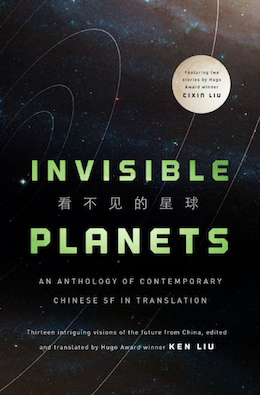Chen Qiufan, Xia Jia, Ma Boyong, Hao Jingfang, Tang Fei, Cheng Jingbo, Liu Cixin: you’ll recognize these names if you’ve been reading Clarkesworld and Tor.com, following the Hugo Awards, and generally reading some of the best speculative fiction written in the past several years. Most of all, though, we have acclaimed writer, translator, and editor Ken Liu to thank for enabling us English-language readers to catch a glimpse of this exciting generation of Chinese SF writers.
In Invisible Planets: An Anthology of Contemporary Chinese SF in Translation, Liu has brought together stunning stories and award-winning authors, each of which has a unique take on what we generally call “speculative fiction.”
According to Liu, this collection includes:
the “science fiction realism” of Chen Qiufan; the “porridge SF” of Xia Jia; the overt, wry political metaphors of Ma Boyong; the surreal imagery and metaphor-driven logic of Tang Fei; the dense, rich language-pictures painted by Cheng Jingbo; the fabulism and sociological speculation of Hao Jingfang; and the grand, hard-science-fictional imagination of Liu Cixin.
Such a rich literary tapestry cannot but draw the reader in and refuse to let her leave. I myself came to this collection having read many of the stories before, but I happily embarked upon each one again, just for the sheer pleasure of it. I’ve often found myself thinking about Ma Boyong’s “The City of Silence,” which I first read in the Apex Book of World SF 3, and Liu Cixin’s Three-Body Trilogy has gained a hold of my imagination that I know will last a lifetime. And how to describe the hypnotic lyricism of Hao Jingfang’s stories? Read Folding Beijing and then go listen to it on the Clarkesworld podcast and tell me I’m exaggerating. I dare you.
But as if this stunning collection weren’t already everything a lover of speculative fiction could want, there’s the fact that women writers are in the majority here. That’s right: out of the seven authors included, four are female. I point this out because I can tell you that, of the approximately 50 works of speculative fiction in translation that were published over the past two years, the vast majority are by men. And yet, I don’t think this is a question of women not writing speculative fiction; rather, it’s a question of who gets published and then translated. Liu’s balanced representation of authors reminds us that excellent speculative fiction is written by both men and women.
I hear you asking, “So what exactly makes these stories remarkable?” It’s their originality, their striking landscapes and unexpected plot twists, their lyricism and pathos. And to top it all off, Liu includes essays by Liu Cixin, Chen Qiufan, and Xia Jia that offer insight into the history of speculative fiction in China and the ways in which rapid modernization and social upheaval have influenced this latest generation of writers.
Certain issues and concerns crop up again and again in these stories: the weight of authority (whether political or spiritual), our responsibility toward and for the aged, the malleability of urban spaces, the threats/benefits of technology, and more. Each of these issues plays out across a variety of landscapes and social classes, suggesting something universal about our 21st century anxieties.
Xia Jia and Liu Cixin both tackle the issue of caring for aging relatives, imagining worlds in which robots assist the elderly (“Tongtong’s Summer”) and God “returns” to Earth as millions of old men (really an alien species) who want to live their last years with their “children”: humanity (“Taking Care of God”). In both instances, we witness inter-generational conflict, and this friction raises the unavoidable reality that we shall all grow old and need caring and compassion. If you thought that compelling speculative fiction was all space battles and killer robots, read these stories.
Concerns about totalitarianism and the crushing of the human spirit are central to Ma Boyong’s haunting retelling of 1984, “The City of Silence,” and Hao Jingfang’s Hugo-Award-winning novellette Folding Beijing. In the former, residents of an unnamed capital are gradually pressured into silence by a government that severely limits the words that people can use, both in face-to-face conversations and over the highly-restricted internet. It is the story of one man’s grasp at a lifeline of personal, unfettered interaction, which is ultimately destroyed by an increasingly omniscient totalitarian ear. Folding Beijing raises concerns about class rigidity and economic pressures in a world where cities can fold and unfold, enabling residents to take turns using the space but also subjecting them to strict hibernation hours. Hao’s story of Lao Dao’s desperate attempt to break through these spatio-temporal barriers in order to earn money to send his daughter to a decent school is at once dazzling and poignant.
These are just a few of the brilliant stories that await you in Invisible Planets. You’ll also find narratives that reimagine what it means to be a “call girl,” or wonder what the world will look like if humans die off but mechanical beasts remain. And I’m still trying to wrap my head around the ethereal beauty of Hao’s “Invisible Planets.”
Liu’s translations allow the uniqueness of each story and authorial approach shine through, making us forget that these stories were originally written in a language other than English. Hopefully, this collection is just the beginning in a long line of books that showcase the broad and varied field of speculative fiction in China. We have much to look forward to.
Invisible Planets is available from Tor Books.
Rachel S. Cordasco earned a Ph.D in Literary Studies from the University of Wisconsin, Madison in 2010, and taught courses in American and British literature, and Composition. She has also worked at the Wisconsin Historical Society Press. A Book Riot and SF Signal contributor, Rachel recently launched a site devoted to speculative fiction in translation. You can follow her @Rcordas and on facebook at Bookishly Witty and Speculative Fiction in Translation.










